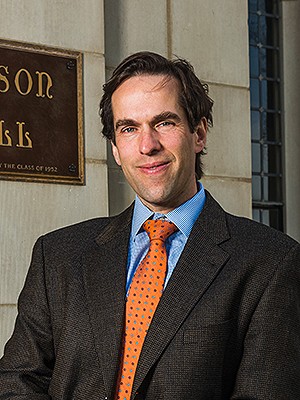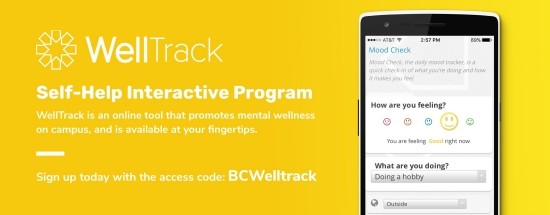Each year, an estimated 1,900 of Boston College’s 14,200 students seek advice and treatment from University Counseling Services (UCS), a department within the Division of Student Affairs dedicated to assuring the mental health and wellness of the BC community.
With a staff of 25 that includes psychiatrists, social workers, psychology post-doctoral fellows, and more than a dozen psychologists as well as a range of clinicians on call, UCS provides crisis intervention; short- or mid-term individual counseling and psychotherapy; consultation; and group therapy. UCS clinicians refer approximately 10–15 percent of department visitors to local professionals for long-term therapy. An on-call clinician is available 24/7 for emergencies.

Craig Burns, UCS director
In the past two years, largely in response to students seeking help, UCS has expanded the size of its staff and the scope of its services to treat anxiety, now the number one reason students visit counseling centers across the country. “Twenty years ago, the primary issue was depression. Now it’s anxiety,” says Craig Burns, UCS director, who points to a 2016 American College Health Association survey showing that 62 percent of undergraduates had experienced “overwhelming anxiety” during the previous year—up from 50 percent in 2011.
As discerning, hard-charging, maturing adults, students should experience healthy, productive levels of anxiety, Burns says. “If we had no anxiety we wouldn’t accomplish anything.” But “overwhelming anxiety” is neither healthy nor productive, he adds. “We want to help students distinguish between normal, adaptive, helpful anxiety and dysfunctional anxiety.”
UCS now offers not only individual therapy and counseling to students for a broad spectrum of mental health concerns but has also introduced a number of group therapies, including interpersonal process groups; coping skills groups; a mood, food, and health group focusing on links between eating issues and mood disturbances; and an anxiety skills-building group. Counseling services has also put into place programs that raise self-awareness and encourage the development and use of interactive, digital tools that help students monitor and bolster their emotions and moods.
Students should contact UCS “if they’re unable to effectively manage their day-to-day experiences,” says UCS Director Craig Burns. (They can make an appointment by calling 617-552-3310 or by visiting UCS’s offices in Gasson 001.)
Burns is convinced that a confluence of technology, economic volatility, and shifting social norms has accelerated the pace and strength of young adults’ anxiety—an insidious development aided and abetted by the omnipresence of smartphones. (According to one recent study, the average 18-to-33-year-old American checks his or her phone 85 times a day, responding to the continuous buzzing of breaking news, texts and photographs and postings from friends and family, and e-mails from professors and employers.)
With a smartphone, “you always feel on edge, having to pay attention to things outside of your control,” says Burns. Through social media in particular, students feel pressured to curate, edit, and doctor their lives, sharing and seeing only the most eventful, exciting, envy-inducing moments. The perceived “norm of how your peers are living is way up here,” he says, raising his hand. “It becomes a social arms race.” It’s also draining. “You need always to be taking care of this virtual identity. It’s harder to be present in anything.”
Last year, UCS introduced WellTrack, an online program accessible through a login access code on the UCS website that teaches and helps students build coping skills at their own pace and time. At any point in the day, students can document their state of mind on WellTrack by generating a “Mood Heatmap,” which can point out that they’re in darker spirits when alone in their room, say, and in a brighter, calmer mood while studying in the library or playing racquetball at the RecPlex with friends. WellTrack also offers quick mental wellness assessments and meditation tools such as ambient noise tracks.

Students may access WellTrack by downloading the app, available online at welltrack.com, or through the Apple App Store or Google Play for Android. Access for the Boston College community has been paid for by UCS (access code: BCWellTrack).
More than 980 students have used the app since it was adopted, and more than 60 percent of all users have returned multiple times, says Burns. He adds that repeat users have reported reductions in anxiety and stress, and calls WellTrack a “low-risk tool” that helps students feel better.
Students can also consult UCS’s Feel Better Now Resources, three dozen guided audio and video tutorials on everything from meditation and relaxation, to managing anger and panic attacks, to writing in a gratitude journal.
In addition, student anxiety can be alleviated through self-reflection. Many Boston College students who attend student formation and vocational discernment retreats are encouraged to think about what is widely known on the BC campus as the “Three Key Questions,” conceived by theology professor and award-winning teacher Father Michael Himes: “What brings me joy? What am I good at? Who does the world need me to be?”
Burns says that along with taking advantage of the services of UCS and its partner organizations, students should also seek counsel from the “indigenous helpers” in their lives—friends, RAs, and parents and guardians. Building and maintaining meaningful social connections will ease stress and anxiety.
In addition to exercising regularly, sleeping for eight hours a night, and eating a balanced diet, Burns says students can bolster their mental health by identifying a “narrative for what matters to them, and why they’re doing what they’re doing” in their studies and friendships, and the trajectory of their lives.
– By Zachary Jason



